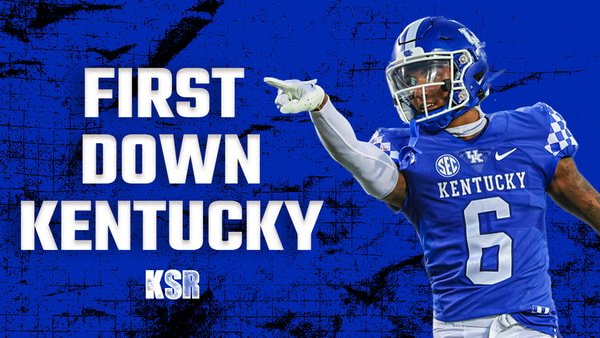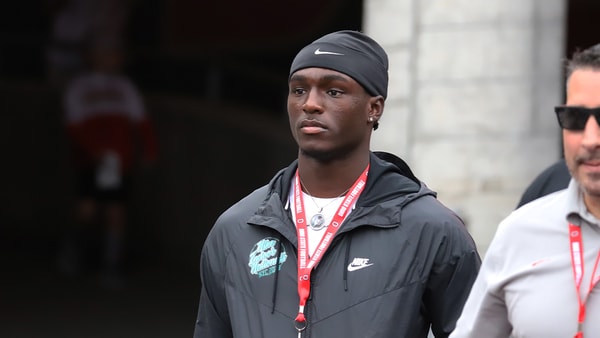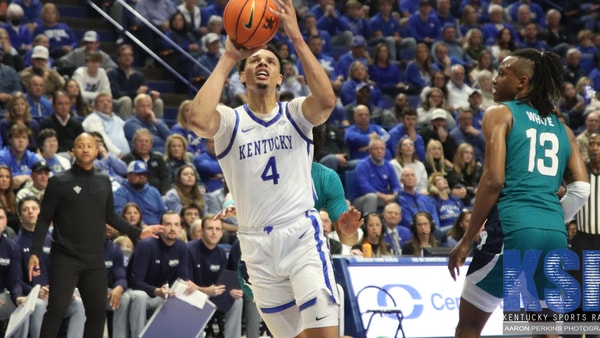What are the hurdles to getting Oklahoma and Texas to the SEC - and what are the benefits?

(Photo: Ronald Martinez/Getty Images)
The summer is supposed to be a slow time on the calendar for college sports – at least until this year. Since the day March Madness ended, we’ve had so… many… topics to discuss. There was Roy Williams retiring, the one-time transfer rule being passed (and the transfer portal subsequently catching fire after it), Coach K retiring, a proposed expansion to the College Football Playoff, Supreme Court rulings, Name, Image, Likeness coming into effect. On and on.
Yet there is no story bigger than the one that dropped at SEC Media Days on Wednesday, as the Houston Chronicle reported that Texas and Oklahoma are in the midst of pursuing membership to the SEC. Yes, the one-time transfer and NIL were big.
But this is the kind of story that can completely alter the college sports landscape as we know it.
With the news now right around 24 hours old, let’s take a deeper dive however. And figure out what could happen, what the potential hurdles are, and how an expanded SEC could completely reshape college football as we know it.
(Also, I discussed this move at length on the Aaron Torres Podcast today. When you’re done reading the article, I encourage you to download for more here)
Potential Hurdles:
Clearly a move like this can’t just happen overnight, and it’s safe to say that there will be a lot of hurdles that Texas, Oklahoma and the SEC would need to jump through to make it happen.
As far as I can tell, there are three big ones that will at least be a hiccup in any potential move for Texas and Oklahoma to the SEC, assuming the move happens at all.
1. Currently constructed TV deals (aka “Grant in Rights”)
Before we get into the nitty gritty here, let’s first explain a boring legal term you’ve probably heard a lot the last 24 hours: “Grant in Rights.” Essentially, “Grant in Rights” is the term that legally binds one entity to another for a period of time. And in this case, the “Grant in Rights” pertains to Texas and Oklahoma’s TV rights. They are tied to the Big 12 through the end of the 2024-2025 college athletics season.
Meaning that even if Texas and Oklahoma wanted to leave for the SEC tomorrow, contractually, the SEC couldn’t earn a dollar of TV revenue from them until the 2025 football season. All that money would go to the Big 12.
That’s also what made Wednesday’s report so interesting: If you read most of the subsequent reports closely, never did they say “Oklahoma and Texas are leaving for the SEC” as much as they said “Oklahoma and Texas plan to tell the Big 12, they will not renew their ‘Grant in Rights’ deals following the 2025 season.”
Early next week, the @TexasLonghorns and @UofOklahoma will send a letter to the @Big12Conference stating that neither school will renew their media contracts when they expire in 2025.
-more-
— Jason Whitely (@JasonWhitely) July 22, 2021
In other words, Texas and Oklahoma aren’t happy with how the next round of TV projections are going. And they believe they can get a better deal somewhere else. Maybe the SEC, maybe not. Just likely not in the Big 12.
Clearly, joining what would become a 16-team SEC monolith would bring the most money. But it also opens up other avenues for the league if the SEC says no (which we’ll get into in a minute). Could they pursue membership in the ACC? The Big Ten? Could Texas pursue independence? What it would mean for Oklahoma if Texas does that, I have no idea. But I do think it’s possible.
Still, it’s clear that Texas and Oklahoma are ready and willing to look at all options. It’s also clear the Big 12 will fight tooth and nail to keep them.
2. How much does the rest of the SEC want them?
Another topic that’s been discussed at length since this news first broke, is the idea that the SEC would need to take a vote before they could add schools. Three quarters of the league needs to agree to bring each school in, which means 11 of 14 schools have to vote a “yes.” Which means it only takes four “no’s” for the SEC to pass.
Now to be clear, the school Presidents would be the ones voting, not football coaches. It’s not as though Greg Sankey will be asking the opinions of Lane Kiffin and Josh Heupel, or even Nick Saban. It comes down to the school presidents. The question though is, will there be a fervor to add these two teams to the league?
Money may trump all (especially considering that again, the school Presidents really don’t care if the football team goes 4-8 or 8-4) but it will be interesting to see what a hypothetical vote would look like. We know that Texas A&M would vote no, because their AD very publicly came out and said he wasn’t in favor of conference expansion on Wednesday at media days (the fact that the original story was broken by a Texas A&M reporter, right as Texas A&M took the podium at media day, when the Texas A&M AD just so happened to be available for questions doesn’t seem to be a coincidence).
There are also mixed reports as to whether Missouri would vote “Yes” or “No. A newspaper reporter in Austin, Texas says Missouri would say no, while a Missouri site itself said not so fast. The argument for Missouri voting “no” is that they dealt with Texas’ crap for years in the Big 12 and have no interest in re-living that chapter in their history.
I'm told Texas A&M and Missouri would be a hard no. Only 2 more needed to block an invitation to Texas, OU.
— Kirk Bohls (@kbohls) July 21, 2021
Have seen a lot of people accepting as fact that #Mizzou would vote against Texas/OU joining the SEC. Don’t believe that’s accurate. It’s obvious A&M is against the move & Aggies may be trying to line up allies, but Mizzou wouldn’t vote no just based on 10 year old hurt feelings
— Power Mizzou (@PowerMizzoucom) July 22, 2021
Then there’s everyone else. While it’s easy to say “money trumps all” (and again, it might) it’s worth noting that a quick straw poll on social media seems to indicate that many of the middle-tier teams in the league, the Arkansas’s, Ole Miss’s and Mississippi State’s of the world don’t seem all that excited about adding the two teams. Admittedly, social media isn’t always an accurate reflection of society, but at the same time, the fans can already see what the President’s might not yet: That two more powers in the SEC bump their football programs down a peg or two in the race to the top of the standings.
No, fan opinion doesn’t matter in theory. But it could lead to some public pressure on the decision makers.
3. Political pressure in Big 12 country
Look, I’m not going to sit here and pretend to claim that I understand the politic dynamics at play in Texas and Oklahoma. But what I do know is that the powers that be at Oklahoma State, TCU, Baylor and Texas Tech aren’t going to go down without a fight.
Oklahoma State has already released a strongly worded statement that basically seems to indicate that if stuff goes down, they’ll be digging in their heels.
Oklahoma State with an assertive statement. pic.twitter.com/BybBf6nCFZ
— Ralph D. Russo (@ralphDrussoAP) July 21, 2021
Now to be clear, there doesn’t appear to be anything legally that these schools could do if Texas and Oklahoma really want to leave, but again, it’s not as though they won’t go down without a fight.
Remember back to the last realignment craze of about a decade ago, and part of the reason that the “Pac-10” nearly became the “Pac-16” was because Oklahoma was basically told they had to take Oklahoma State with them, and the same with Texas and Texas Tech.
Before any final decisions are made, I expect a lot of politicians and lawyers to get involved.
What Expansion Would Look Like, and What Would it Mean for the SEC?
Now that we’ve got the boring, hypothetical hurdles out of the way, let’s get to the fun part: If the SEC can actually land Oklahoma and Texas, what would the league look like and what would it mean for the league as a whole and college football in general?
The SEC would seemingly go to four, four team divisions, instead of splitting teams “East and West”:
My main man Nick Roush already hit on this in detail this morning, so one, I encourage you to go read his article. Because of it I won’t go into too much depth, but ultimately, 16 teams almost certainly means the death of the “SEC East/SEC West” model in favor of four, four team divisions.
The benefits would be simple: If the SEC added a ninth conference game, a schedule could be structured in a way where every team would play every other, home and on the road, at least once over a four-year period. Again, you can read the details here.
Now some of you might be asking: “Well why would I want a ninth SEC game?”
Again, it’s simple.
Remember, we’re headed toward a future with an expanded playoff, where losing one or two games won’t keep you from being competing for a national championship.
So adding a ninth game would create fewer boring out of conference games no one wants to see, and fans don’t want to pay for. It would add more inventory for TV networks, which would only push up the amount of money each school makes. And again, with an expanded playoff, it wouldn’t hurt the league’s ability to get several teams (most years three, sometimes maybe four) into the playoff.
Another thought I had: Rather than adding a ninth regular season game, would we ever see a scenario where the four division winners meet, kind of in a playoff, with the two winners facing off in the SEC title game?
The opportunities are endless.
What about the playoff itself?
Over the last 24 hours, I’ve spent a lot of time thinking about this. And I’ll be honest: I don’t see any downside to the SEC’s pursuit of getting more teams in the playoff by adding Oklahoma and Texas. Now, will there be a downside for individual schools? Especially, again, the mid-tier schools like Ole Miss, Mississippi State and Missouri? Sure. But the league as a whole? I don’t see it.
First off, you’re adding two marquee brands, including one that has basically been a playoff fixture since the playoff began. That would be Oklahoma, which has been to the playoff four times in seven seasons, tied for second most with Ohio State, behind only Clemson and Alabama. Now yes, I know that Oklahoma hasn’t had a ton of success against SEC teams in the playoff (going 0-3). But they are clearly one of the 4-5 best programs in the sport right now. Texas’s brand cache (even if it hasn’t resulted in a ton of wins and losses) speaks for itself.
Even without Texas and Oklahoma, the league will probably get at least three teams in, in any given year. And if they add them, I’d expect them to get four routinely. That’s especially true given the fact that the Big 12 would be that much weaker. Assuming the league even exists in any form, they would probably – to use a basketball term – be a “one bid league” for the playoff, as opposed to one that could get two or three with Texas and Oklahoma.
Anyway all this is a long-winded way of me saying, the more I think about the Texas and Oklahoma stuff, the more I think it makes sense for both sides: The Oklahoma and Texas side, and the SEC’s as a whole.
There will be clearly be roadblocks and hurdles (some from within the SEC).
Still, all I would say is buckle up.
I don’t expect this chatter to slow down any time soon.








Discuss This Article
Comments have moved.
Join the conversation and talk about this article and all things Kentucky Sports in the new KSR Message Board.
KSBoard